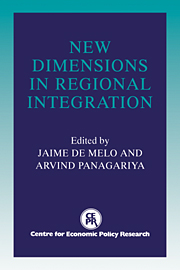Book contents
- Frontmatter
- Contents
- List of figures
- List of tables
- Preface
- Foreword
- Acknowledgements
- List of conference participants
- PART ONE SYSTEMIC ISSUES
- 1 Introduction
- 2 Regionalism and multilateralism: an overview
- Discussion
- 3 Regionalism versus multilateralism: analytical notes
- Discussion
- 4 Multilateral and bilateral trade policies in the world trading system: an historical perspective
- Discussion
- 5 GATT's influence on regional arrangements
- Discussion
- PART TWO COUNTRY ISSUES
- Index
Discussion
Published online by Cambridge University Press: 04 May 2010
- Frontmatter
- Contents
- List of figures
- List of tables
- Preface
- Foreword
- Acknowledgements
- List of conference participants
- PART ONE SYSTEMIC ISSUES
- 1 Introduction
- 2 Regionalism and multilateralism: an overview
- Discussion
- 3 Regionalism versus multilateralism: analytical notes
- Discussion
- 4 Multilateral and bilateral trade policies in the world trading system: an historical perspective
- Discussion
- 5 GATT's influence on regional arrangements
- Discussion
- PART TWO COUNTRY ISSUES
- Index
Summary
Commenting on Douglas Irwin's papers is no fun. They are historically literate. They are elegantly written. They are carefully argued. They leave the discussant little to say. Chapter 4 here is no exception. In an approach to policy analysis near and dear to my heart, Irwin looks back at previous historical episodes of successful and failed trade liberalisations to see what light they shed on current controversies over how to best achieve an open trading system. The motivation, as the chapter makes clear, derives from the trend in recent years away from the multilateralism of the GATT and toward regional – in some cases, bilateral – trade agreements. At issue is whether bilateralism or multilateralism is more conducive to trade liberalisation, a question upon which Chapter 4 seeks to shed historical light.
If the author strongly endorsed one or the other strategy, it might have been possible for us to engage in an entertaining fight. What he has instead done is to conclude – correctly – that the answer depends on the circumstances. There is good bilateralism and bad bilateralism. Bilateral agreements can be trade-creating or trade-diverting. Bilateral agreements can lead to a cascade of other bilateral agreements and to a general opening of trade, or to retaliation against discrimination and to the fragmentation of trade. Similarly, there is good multilateralism and bad multilateralism. Multilateral negotiations can reduce negotiating costs through economies of scale, or they can divert attention away from potentially beneficial bilateral deals.
History provides, as Irwin notes, examples of all of these cases: of benign bilateralism in the 1860s and pernicious bilateralism in the 1930s; of successful multilateralism in the 1960s and failed multilateralism in the 1920s.
- Type
- Chapter
- Information
- New Dimensions in Regional Integration , pp. 119 - 127Publisher: Cambridge University PressPrint publication year: 1993



